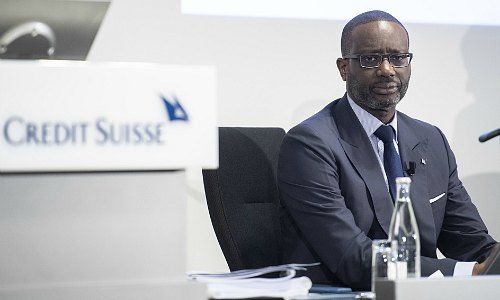A press conference about Credit Suisse’s quarterly results turned into an attempt by CEO Tidjane Thiam patch up his credibility. Did it work?
The Swiss bank frequently orders its entire C-suite back to Zurich to present results to media. But Credit Suisse’s third-quarter media briefing on Wednesday was particularly symbolic: it is the first time the bank’s 12-person top management including CEO Tidjane Thiam appeared as a group following a surveillance scandal.
The appearance signaled that more is at stake than a simple read of the wealth manager’s profit-and-loss statement: after all, Thiam has skipped out on the event before. The group’s closing ranks in Zurich signals loyalty to the battered CEO, when he needs it most.
Covert Spy Scheme
If Thiam appeared slightly distracted in presenting the numbers, it soon became apparent why: he closed his remarks with a prepared statement on a lurid surveillance scandal which has gripped the Swiss banking industry. For the first time, Thiam himself stated that he hadn’t known that a long-time associate – operating boss Pierre-Olivier Bouée – had arranged for Iqbal Khan to be tailed by a private detective after leaving Credit Suisse for UBS.
Thiam said he hoped that Khan and his family – the 43-year-old’s wife was present during an altercation with the detective in downtown Zurich – hadn’t suffered from the event, and wished them well. He also thanked Credit Suisse’s clients for sticking with the bank during the scandal, but said he wouldn’t comment in detail because of an ongoing criminal investigation.
No Personal Vendetta
He then proceeded to do exactly that – giving the roughly two dozen journalists on hand the impression he wanted to grab his chance to restore his credibility. As Thiam responded to all questions about Khan (the overwhelming bulk of questions centered not on the third quarter, but on spygate) as fully as he can, he relaxed noticibly.
The CEO, who has responded irascibly when questioned by press in the past, probably surprised even himself by extending the briefing when his minder wanted to wind down. Besides reinforcing the message that he hadn’t known of Bouée’s clandestine efforts, Thiam hit home three main messages.
The first is that Credit Suisse hasn’t suffered any so-called material damage from spygate – meaning that unpleasant as the brouhaha may be, business is fine. Second, Thiam has not personal vendetta against Khan (the two are next-door neighbors in a lakeside town on Zurich’s «gold coast»). The CEO didn’t detail his conflict Khan, whom he plucked from relative obscurity in 2015 to run $750 billion unit.
Private vs Business
Thiam did make clear that the private matter didn’t affect business at all: the private bank’s favorable first- and second-quarter showing this year proved this, he noted. «I gave him capital and resources,» during this period, Thiam said. « I never confuse the personal and the professional.»
His third point was to subtly distance himself from Bouée, who left the bank over the scandal. Thiam said those responsible for arranging for the surveillance of Khan may not have believed they were doing anything wrong.
Surveillance and observation of traders, for example, is routine not just in Credit Suisse but in other banks with major dealing rooms. Spying on unsuspecting employees is another matter altogether – and unacceptable.
Drawing a Line?
Thiam said he and Bouée weren’t close, though his respect for the departed banker was obvious: «I’ve been here four and a half years, we’ve maybe had dinner once. That’s not how I define a friend,» Thiam said. He rejected a depiction that Bouée was his closest confidante, saying he always maintained professional boundaries to his direct reports.
The truth is likely a bit murkier: Thiam and Bouée met nearly 20 years ago at McKinsey. When Thiam left for British insurer Aviva in 2002, Bouée joined him two years later. In 2008, they both defected to Prudential, where Thiam had secured the CEO post (a pattern they repeated four years ago when they joined the Swiss bank together).
Though «POB,» as Bouée was known within Credit Suisse, had to leave the bank, Thiam said he had never considered doing so. With that, the CEO draws a line under a deeply personal scandal. His appearance shed no light on what truly transpired, but to his credit, Thiam didn't duck the inevitable questions.




































